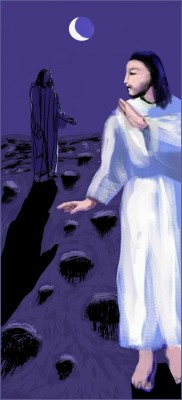Scripture: Lectionary: 24. First Sunday of Lent. Deuteronomy 26:4-10. Psalm 91:1-2,10-11,12-13, 14-15. Romans 10:8-13. Luke 4:1-13
Lent can be a great time for deepening our faith through reflecting and meditating on the Sunday readings. They are especially helpful for starting a new week with some new motivation from the themes and prayers they bring to us through the liturgy of the word. This year of faith encases the year of Luke on most Sundays of the liturgical year. Luke is our leader for 2013 up to Advent.
Our reading from Deuteronomy contains the first of two liturgical declarations: the first fruits ceremony; and the tithe ceremony. We are given only the first in the selected reading. We can easily think of it as paralleling our bringing up our gifts of bread and wine to the altar after having prayed the Creed (either the Nicene or the Apostles’ Creed). The Creed of Israel belongs to a set liturgical action—the offering of the first fruits. It is a prescribed text that is to be said as given in the Torah in this liturgical declaration. “After reciting a brief history of Israel (salvation history) and speaking about God, the farmers now turn to speak to God. In this way they express their feeling that they stand directly in God’s presence….This recitation summarizes the historical basis of Jewish identity and has found a featured place in the Pesach Haggadah (The Passover Seder).” (Etz Hayim, p.1141).
Thus we are lead to realize that salvation history is one of the great themes for this Sunday. Just as the saving acts of God were done for the Israelites, now Jesus works for our salvation through the royal road of the Cross. This is possible to the Son of God who constantly “works” with the Father in this plan of salvation meant for all peoples.
Jesus overcomes the temptations of the devil by knowing Deuteronomy well. He refutes each temptation with a citation from the Torah’s important covenant scroll, Deuteronomy. It is a covenant of love that contains the historical declaration of faith professed by God’s prophet and servant, Moses.
Jesus’ humanity is featured in this temptation scene. He overcomes the desire to have power, to seek only pleasure, to be selfish. Luke and Matthew have the same scene but change the order of the temptations. Luke always emphasizes the sacred city of Jerusalem, therefore, he makes that the last temptation is his narrative.
The liturgical psalm is perfect for this Sunday for it is the one that both Jesus and the devil are citing—it thus fills out the context of this Sunday as one dedicated to overcoming sin and temptation by realizing our salvation has been achieved through Jesus’ words and actions.
Paul then gives us a beautiful insight into the faith of the heart and the profession of that deep interior trust in the profession made by our lips. The Creed needs to become alive in our hearts. Our faith helps us to overcome sin and temptation.
Luke is the Evangelist of the Holy Spirit and of Prayer. He also tells us the most about Mary. We are led by the Holy Spirit during this season of Lent, we have Mary as our model for discipleship, and we are guided by prayer based on the Sacred Scriptures. We know Christ through the Scriptures. Amen.
Copyright 2013 Fr. Bertrand Buby, S.M.
About the Author

Guest
We welcome guest contributors who graciously volunteer their writing for our readers. Please support our guest writers by visiting their sites, purchasing their work, and leaving comments to thank them for sharing their gifts here on CatholicMom.com. To inquire about serving as a guest contributor, contact editor@CatholicMom.com.



.png?width=1806&height=731&name=CatholicMom_hcfm_logo1_pos_871c_2728c%20(002).png)
Comments